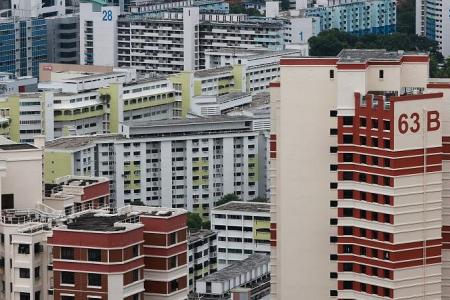First-timers buying HDB resale flats to get more support
First-timers buying Housing Board resale flats could get more help, as the Government mulls additional support for those who are looking to buy their first home.
National Development Minister Desmond Lee on Monday said measures to reduce the high rejection rate for Build-To-Order (BTO) flat applications are also being studied, to ensure new flats are prioritised for those with genuine and urgent housing needs.
HDB data shows that 40 per cent of applicants invited to book a BTO flat ended up not selecting their flat.
In his speech on his motion on affordable and accessible public housing, Mr Lee reiterated that the Government is studying how to provide even more support for those looking to buy their first homes. These new measures will be announced when ready, he added.
“We are doing our utmost to improve the accessibility and affordability of HDB flats,” he said. “We know that policies cannot retain static as the aspirations and needs of our people change.”
Mr Lee had filed his motion in response to a separate one by Progress Singapore Party (PSP) Non-Constituency MPs Leong Mun Wai and Hazel Poa.
Acknowledging that Singaporeans are unhappy about the long waiting times and delays of BTO flats in recent years due to the Covid-19 pandemic, Mr Lee said HDB has been catching up on delayed projects.
Outlining the Government’s plans to meet the supply crunch, he noted that more than 23,000 flats were completed in 2022, with another 23,000 flats slated to be handed over to buyers in 2023.
More BTO flats with shorter waiting times of under three years will also be launched from 2024 onwards, he said, adding that the Government aims to roll out around 2,000 to 3,000 of such BTO flats each year by 2025, similar to pre-Covid-19 levels.
“After that, over a period of time, we will recalibrate our building programme so that shorter waiting time flats form a larger proportion of our supply of new flats,” said Mr Lee.
HDB has ramped up the supply of BTO flats, and pledged to launch up to 100,000 new flats between 2021 and 2025 if needed to meet demand.
Mr Lee cited several factors that led to the tight housing supply and rising resale prices in the last three years, including the Covid-19 pandemic delaying the construction and completion of BTO flats.
The disrupted supply of BTO flats led some buyers to turn to the HDB resale market, pushing up demand for resale flats, he said.
Demand for new flats also went up as some joined the BTO flat queue earlier to try and secure a flat, causing further anxiety, he noted. In the last three years, the number of first-time BTO applicants rose by 80 per cent, and second timers by 140 per cent, compared to the period from 2017 to 2019.
Shifts in social norms, such as younger Singaporeans who wish to move out earlier to live on their own, also pushed up housing demand, he said.
Besides ramping up supply of flats, Mr Lee said the Government has also kept BTO prices “almost flat” despite strong demand and construction costs rising by almost 30 per cent in the past two years.
For instance, a four-room BTO flat in a non-mature estate was priced, on average, at $341,000 in 2019 and $342,000 in 2022, he said.
Mr Lee added that close to 70 per cent of the BTO flats launched in 2022 can be purchased by a household with a median income of $8,400. These households would use a quarter or less of their household income to pay their mortgage instalment, he said.
The home price to income ratio for a four-room flat in a non-mature estate has also dropped from six in 2012 to below five by 2018, he said. This means that households use five years or less of their total household income to pay for a home.
“This is because the annual increase of BTO flat prices in non-mature estates is less than 1 per cent, lower than the 3 per cent annual increase in incomes,” said Mr Lee.
In comparison, the home price to income ratio in London, Los Angeles and Sydney is eight to 15 times, and more than 20 in Hong Kong, he noted.
While Singapore’s public housing system is “far from perfect”, it has made housing accessible and affordable for Singaporeans and the Government must always keep improving it, said Mr Lee.
“90 per cent home ownership in a cosmopolitan city is not something that many other major cities have been able to achieve,” he said.
Get The New Paper on your phone with the free TNP app. Download from the Apple App Store or Google Play Store now

